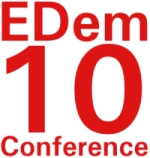|
|
EDem10 - Call for Papers20. October 2009 – 15:22 by Centre for E-Government |
 “A revolution doesn’t happen when a society adopts new tools. It happens when society adopts new behaviours.“ (Clay Shirky)
“A revolution doesn’t happen when a society adopts new tools. It happens when society adopts new behaviours.“ (Clay Shirky)
EDem10
4th International Conference on eDemocracy
6. and 7. May 2010
Danube-University Krems
Call for Papers
Scientific eDemocracy visions and models have been developed since the 1960s, but it is now, during the first decade of the 21st Century, that they are becoming reality, being tested and implemented. Extensive IT provides the necessary basis, but it is not the developments in IT alone that are responsible for successful eDemocracy projects – it is due all those who use and apply them, as they adopt new behaviours and change old ones. The new, digital generation lives and breathes new values: they collaborate, compile content together, share their ideas, create networks on social platforms and organise themselves quickly and simply. The new values held, the new behaviours adopted, the changed mindset, along with improved usability and a still-increasing use of the internet, has led to a rapid and radical change in our society.
The EDem10 focuses on these changes which can be seen occurring in different areas and which are manifest in different way:
- Transparency & Communication (freedom of information, free information access, openness, information sharing, blogging, micro-blogging, social networks, data visualization, eLearning, empowering, …);
- Participation & Collaboration (innovation malls, innovation communities, bottom up, top down, social networks, engagement and accountability, collaborative culture, collaboration between C2C, G2C, …);
- Architecture, Concepts & Effects (access and openness, user generated content, peer production, network effects, power laws, long tail, harnessing the power of the crowd, crowd sourcing, social web, semantic web, …);
- Different Fields: open government initiatives, eDemocracy, eParticipation, eVoting, eDeliberation;
- Approaches and Disciplines: law & legal studies, social sciences, computer sciences, political sciences, psychology, sociology, applied computer gaming and simulation, democratic theory, media and communication sciences;
- Multidisciplinary and Interdisciplinary Approaches;
- Research Methods.
On primary aim is to bring together researchers and practitioners. We would like to invite individuals from academic, applied and practitioner backgrounds as well as public administration offices, public bodies, NGO/NPOs, education institutions and independent organisations to submit their research and project papers.
The main conference language is English; submissions in German (with an abstract in English) are also acceptable.
Further Information:
Tags: CfP, conference, EDem10, eDemocracy








